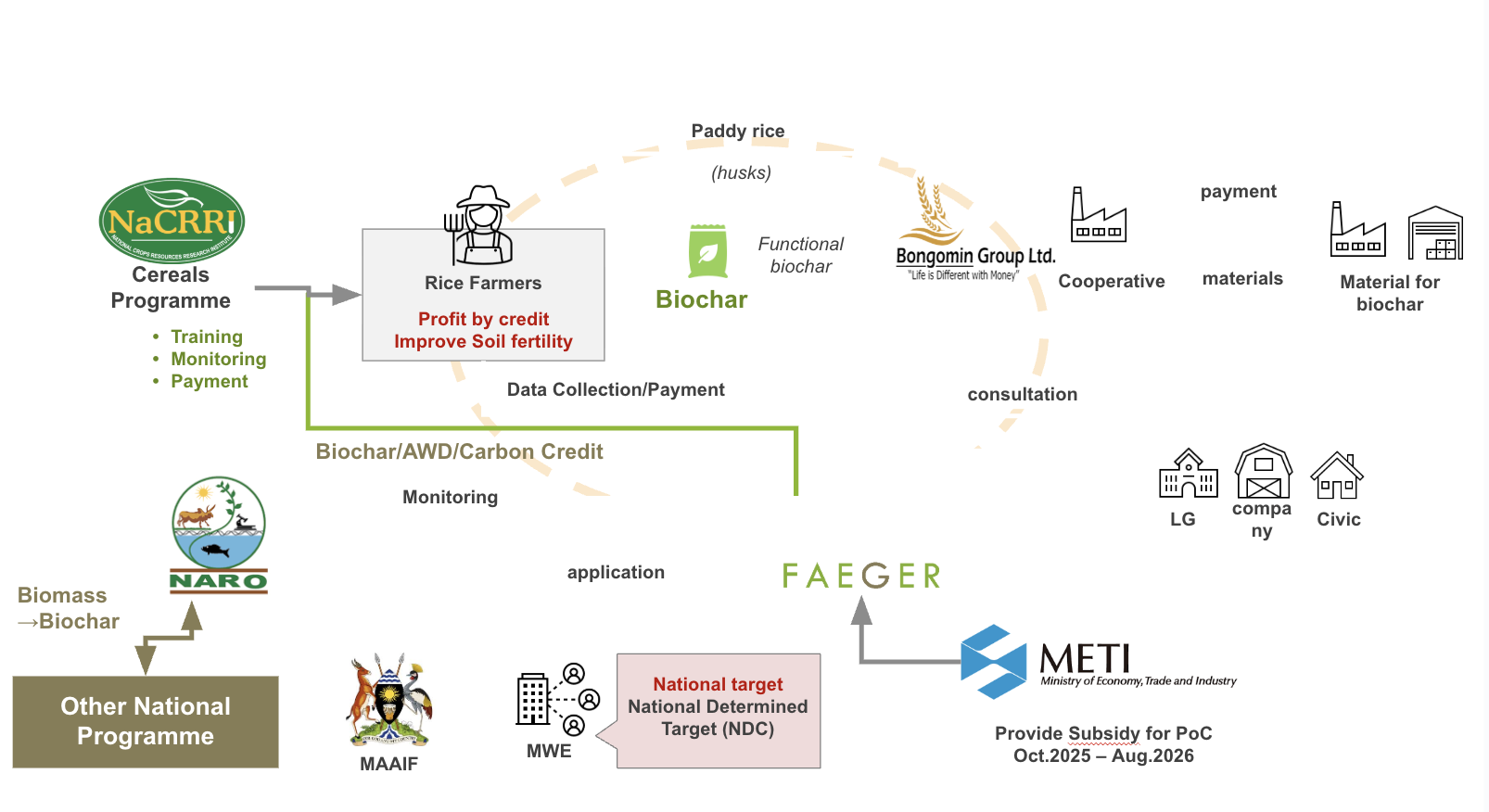2025.11.10
Faeger Co. Ltd.'s “The Republic of Uganda/ Pilot Project for the Promotion of Climate-Smart Rice Cultivation Using Carbon Credits” Was Adopted for the FY2024 Supplementary Budget Subsidy for Global South Future-Oriented Co-Creation Projects (Small-Scale Demonstrations/ Feasibility Study Projects) by the Ministry of Economy, Trade and Industry ~Project Commenced in October~
Faeger Co. Ltd. (Head Office: Chiyoda-ku, Tokyo; CEO: Takahiro Ishizaki) announces that its project named “The Republic of Uganda/ Pilot Project for the Promotion of Climate-Smart Rice Cultivation Using Carbon Credits,” has been adopted for the FY2024 Supplementary Budget Subsidy for Global South Future-Oriented Co-Creation Projects (Small-Scale Demonstrations/ Feasibility Study Projects) by the Ministry of Economy, Trade and Industry as of August 1, 2025.
The adopted project aims to verify the technical effectiveness and business feasibility of a project in Uganda that achieves both improved productivity and profitability of rice cultivation and decarbonization through the generation of carbon credits by introducing environmentally friendly rice cultivation technologies.
*The dedicated website for the FY2024 Supplementary Budget Subsidy for Global South Future-Oriented Co-Creation Projects (Small-Scale Demonstrations/ Feasibility Study Projects)

Background of the Project
In recent years, rice demand has rapidly increased in Uganda. In response, the Government of Uganda formulated the National Rice Development Strategy (NRDS), under which the Ministry of Agriculture, Animal Industry and Fisheries (MAAIF) and the National Crop Resources Research Institute (NaCRRI) have been promoting technological development and dissemination. As a result, the country’s rice cultivation area has expanded significantly, from 80,000 hectares in 2008 to 260,000 hectares in 2024.
Uganda also places strong emphasis on climate change mitigation. In its Nationally Determined Contribution (NDC), the government identifies rice cultivation as a major source of greenhouse gas emissions and is working to develop climate-resilient technologies that simultaneously address climate risks and enhance farmer profitability. In April 2025, regulations governing agricultural carbon credits will come into effect. In preparation for methodology registration, NaCRRI has begun developing technologies such as biochar application and Alternate Wetting and Drying (AWD) in paddy fields. These efforts are expected to accelerate the commercialization of carbon credit projects in the agricultural sector.
Against this backdrop, Faeger has decided to utilize this subsidy to quantify the effects of biochar application and the introduction of Alternate Wetting and Drying (AWD) on agricultural productivity and greenhouse gas (GHG) mitigation in selected plots within the Doho Irrigation Scheme in Mbale District, Eastern Uganda (covering a total area of approximately 2,000 hectares) and to assess the business feasibility, including the potential for carbon credit generation. Prior to launching this project in October, Faeger had already been working on generating carbon credits based on these two methodologies in Japan and Southeast Asia.
Biochar Application
Biochar is a carbon-rich soil amendment produced from biological resources (biomass), such as wood or rice husk, through carbonization. If biomass is left as it is, the carbon it contains is decomposed by microbial activity and released into the atmosphere as carbon dioxide. However, by converting biomass into biochar and applying it to soil, the carbon can be stably stored in the soil over the long term (carbon sequestration).
As both GHG emissions reduction and carbon removal from the atmosphere are essential for addressing climate change, biochar has strong potential in the carbon-removal space, particularly in the agricultural sector. In addition, biochar can improve soil conditions, contributing to reduced fertilizer requirements and increased crop yields.
Alternate Wetting and Drying (AWD)
Alternate Wetting and Drying (AWD) is a water management technique for paddy rice cultivation in which fields are intermittently drained and re-flooded, except during the crop establishment and flowering stages. By periodically allowing the soil to dry before reapplying water, AWD reduces the emissions of methane, a major greenhouse gas, by decreasing the duration of anaerobic conditions in paddy soils, while also lowering water use.
Expected Impacts
The introduction of biochar application and AWD to rice paddies in Uganda is expected to increase yields through improvements in soil quality, thereby boosting farmers’ incomes. In addition, revenues from carbon credit sales, after deducting applicable fees, will serve as an additional source of income for rice farmers, directly contributing to higher profitability.
Through this project, a wide network with rice farmers in Uganda will be established. As farmers’ incomes rise and their purchasing power strengthens, demand for agricultural products and services—such as agricultural inputs, climate-resilient materials, smart farming equipment, and agricultural digital solutions—is expected to increase. This is anticipated to contribute to the expansion of exports from Japan to Uganda and support the further scaling of Japanese companies’ business activities in the African market.